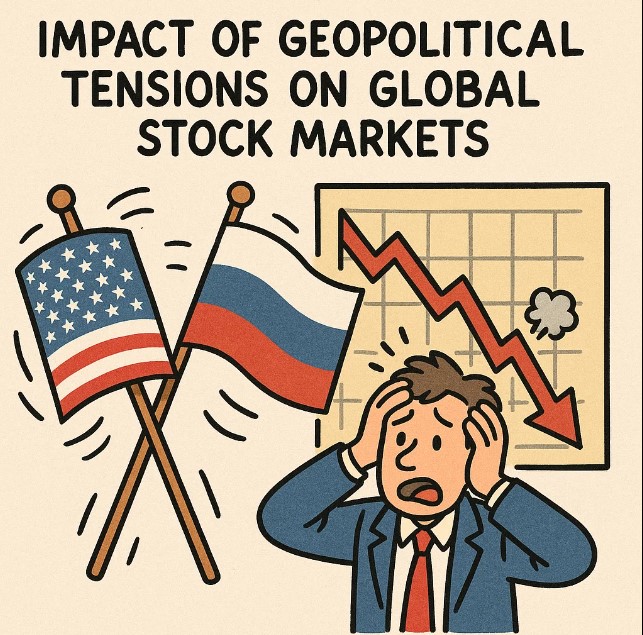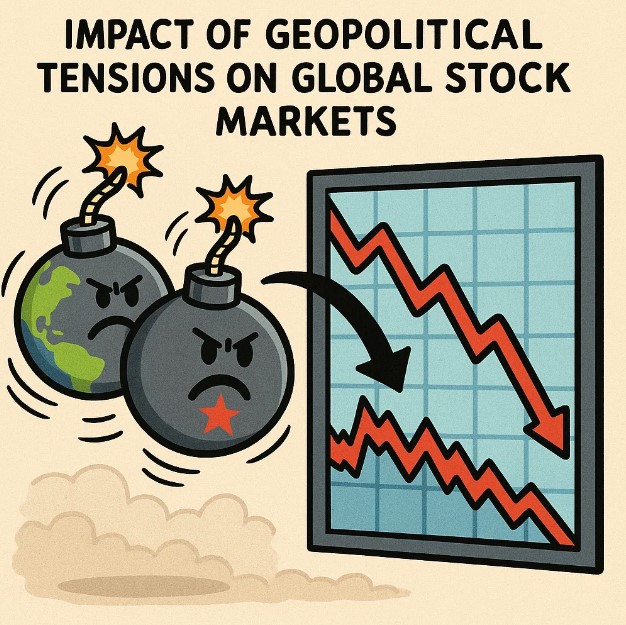
Impact of Geopolitical Tensions on Global Stock Markets
Geopolitical tensions have long been a catalyst for uncertainty and volatility in global stock markets. With the interconnectedness of today’s global economy, any political instability or conflict in one part of the world can have ripple effects on markets in distant regions. In this blog, we will explore how geopolitical events—such as military conflicts, trade wars, and diplomatic crises—can influence global stock markets, investor sentiment, and market stability.
As geopolitical conflicts escalate, investors often flee to safe-haven assets, causing sharp declines in stock markets. However, these tensions can also lead to strategic shifts, with diversification becoming a key strategy to mitigate risk and seize emerging opportunities.
1. The Immediate Reaction: Increased Volatility
Whenever a geopolitical crisis arises, the first response from the markets is often a surge in volatility. Investors, spooked by uncertainty, may sell off riskier assets in favor of safer investments. This "flight to safety" typically leads to an increase in demand for gold, U.S. Treasury bonds, and other low-risk assets. On the other hand, stocks, especially those in the affected region or industry, tend to fall sharply as investors become more risk-averse.
Example:
The ongoing tensions between Russia and Ukraine, for instance, caused a sharp decline in global stock markets in early 2022, particularly in sectors such as energy and mining, due to fears of supply disruptions. Meanwhile, gold prices soared as investors flocked to perceived safe-haven assets.
2. Long-term Impacts: Economic Slowdowns and Shifts in Investment Strategies
While the immediate effect of geopolitical tensions may be panic selling, the longer-term impacts are often more profound and can lead to economic slowdowns. Geopolitical conflicts can disrupt trade routes, harm supply chains, and increase commodity prices, all of which contribute to inflationary pressures and slower economic growth. These effects can reduce corporate profits and force central banks to adjust monetary policies, which, in turn, affects the performance of stock markets.
Example:
The trade war between the U.S. and China in 2018-2019 led to higher tariffs on a wide range of products, which ultimately raised production costs for companies. This contributed to reduced profit margins and slower economic growth, leading to a bear market in some sectors, especially those reliant on global supply chains.
3. Regional Impacts: Varying Effects Across Global Markets
Geopolitical tensions do not affect all markets equally. The proximity of the conflict, the sector in question, and the political stability of neighboring regions play a significant role in determining the extent of the impact. For example, a war in the Middle East may have a far greater impact on energy prices and stocks in energy sectors than on tech stocks based in North America or Asia.
Example:
The ongoing tensions in the Middle East, particularly with oil-rich nations, have a direct impact on global energy prices. These rising energy costs can weigh down global growth, which affects stocks in every region. Conversely, the European stock markets, particularly those with heavy exposure to energy sectors, tend to be hit harder by Middle Eastern conflicts.

4. Investor Sentiment and Confidence: The Role of Political Stability
Investor sentiment plays a crucial role in how stock markets react to geopolitical tensions. Markets are often driven by investor expectations and emotions, and any threat to political stability—whether from war, terrorism, or diplomatic crises—can drastically reduce market confidence. If investors lose faith in political leaders' ability to handle crises, they may withdraw their capital, leading to sharp declines in stock prices.
Example:
In the lead-up to the U.S. elections in 2020, the uncertainty surrounding the political climate led to heightened volatility in the stock markets. While the uncertainty was not the result of a geopolitical conflict, it illustrated how political uncertainty—especially in major economic powers—can significantly impact global investor sentiment and stock markets.
5. Energy Markets and Commodity Prices: The Ripple Effect
One of the most direct ways in which geopolitical tensions affect global stock markets is through energy markets. Conflicts in oil-producing regions often lead to spikes in oil and gas prices, which can fuel inflation and slow down global economic activity. Energy price fluctuations influence a wide range of industries, including transportation, manufacturing, and agriculture, which can impact stock performance across various sectors.
Example:
The Gulf War in 1990-1991 saw oil prices skyrocket due to fears of supply disruptions. This had a significant impact on global stock markets, as higher oil prices led to increased production costs across industries and reduced consumer spending, causing a slowdown in global economic activity.
6. Diversification as a Risk Mitigation Strategy
Investors often turn to diversification to protect themselves from the risks posed by geopolitical tensions. By spreading investments across different asset classes and regions, investors can reduce the impact of regional political crises on their portfolios. This strategy not only helps mitigate risk but also takes advantage of opportunities that may arise from geopolitical events, such as investing in companies or sectors that benefit from rising commodity prices or government defense spending.
Example:
During periods of geopolitical tensions, investors often look to emerging markets for growth opportunities. These markets may offer higher returns due to their lower correlation with developed markets, which are more directly impacted by geopolitical risks. Conversely, some investors may choose to increase their exposure to gold, which traditionally performs well during times of geopolitical crisis.
7. Conclusion: Navigating Geopolitical Risks in the Stock Market
Geopolitical tensions have far-reaching consequences for global stock markets, affecting everything from investor sentiment to energy prices and economic growth. While short-term volatility is inevitable, the longer-term effects are more nuanced, often requiring investors to adjust their strategies to manage risk effectively. The key takeaway is that diversification, a focus on long-term economic fundamentals, and staying informed about political developments are essential to navigating these challenges.
As geopolitical risks remain a persistent threat in an increasingly interconnected world, investors must be prepared for the unexpected and adjust their portfolios to mitigate the impact of these events on their investments.
How do geopolitical tensions influence global stock markets and investor behavior?
